Amsterdam violence exposes tensions in society and spills over to politics
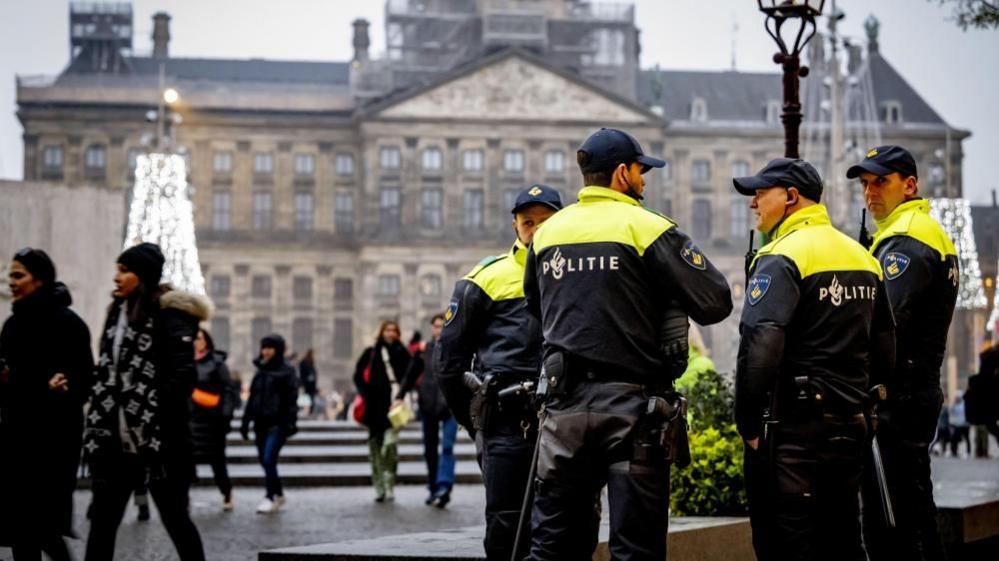
Tensions remain high in Amsterdam after last week's violence
- Published
A fragile calm hangs over the Dutch capital, still reeling from the unrest that erupted a week ago when Israeli football fans came under attack in the centre of Amsterdam.
City officials described the violence as a "toxic combination of antisemitism, hooliganism, and anger” over the war in Gaza, Israel and elsewhere in the Middle East.
As the streets are cleared of Maccabi Ultras stickers and tensions linger, there is concern about the damage done to relations between Amsterdam’s Jewish and Muslim communities.
The tensions have spilled over into Dutch politics too.
The Netherlands' coalition government has been left hanging by a thread after a Moroccan-born junior minister resigned because of language used by coalition colleagues.
Amsterdam had already seen protests and tensions because of the war in the Middle East, and local Rabbi Lody van de Kamp believes it was like a tinderbox: "If you put 2,000 [Israeli] football supporters on to the streets, you know you are in trouble.”
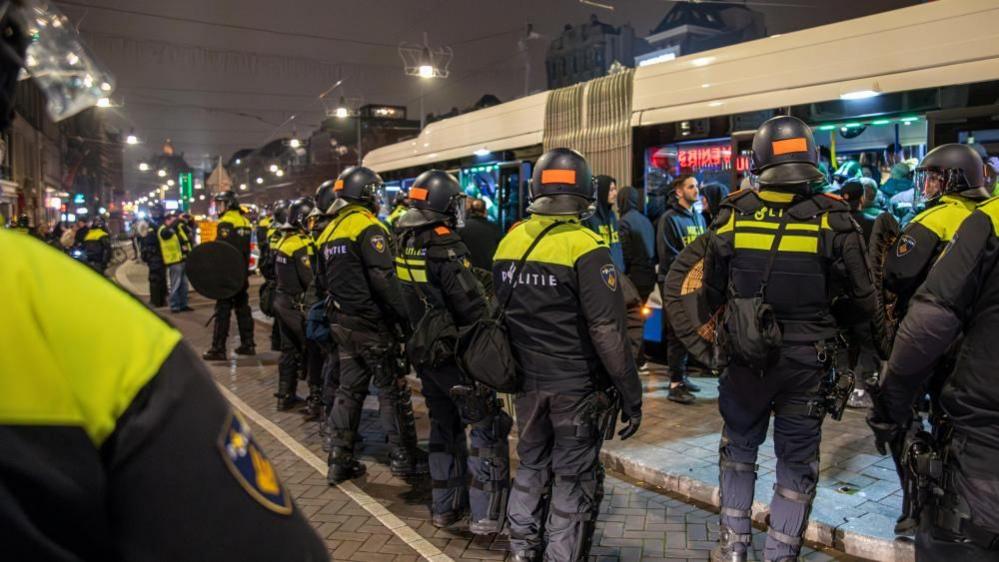
Police were out in force on 8 November but were unable to prevent a series of violent attacks
Maccabi Tel Aviv fans had arrived in the city for a Europa League match against Ajax and footage was widely shared the night before showing a group of fans climbing up a wall to tear down and burn a Palestinian flag.
An Amsterdam council report said taxis were also attacked and vandalised.
Emine Uğur, a well-known columnist in the Muslim community, says underlying tensions surrounding the war in Gaza meant that the ensuing violence was "a long time coming".
She speaks of a lack of acknowledgement of the pain felt by communities affected by a conflict that had left many without an outlet for their grief and frustration.
The flag-burning incident as well as anti-Arab chants were seen as a deliberate provocation.
But then messages calling for retaliation appeared on social media, some using chilling terms such as "Jew hunt".
On the evening of the match, a pro-Palestinian protest was moved away from the Johan Cruyff arena, but it was in the hours afterwards that the violence erupted.
The 12-page report by Amsterdam’s authorities describes some Maccabi supporters “committing acts of vandalism” in the centre.
Then it highlights “small groups of rioters… engaged in violent hit-and-run actions targeting Israeli supporters and nightlife crowd” in locations across the city centre. They moved “on foot, by scooter, or car… committing severe assaults”.
The mayor of Amsterdam, Femke Halsema, described the incidents as deeply alarming, and noted for some they were a reminder of historical pogroms against Jews.
For a few hours, swathes of the Jewish community in a European capital felt as though they were under siege.
These events coincided with the anniversary of the Nazi pogroms on Jews in 1938, also known as Kristallnacht.
That only intensified the fears of Amsterdam's Jewish community, although local imams and other members of the Muslim community took part in the commemorations.
Senior members, including Esther Voet, editor of the Dutch Jewish Weekly, organised emergency shelters and coordinated rescue efforts for those fearing for their lives.
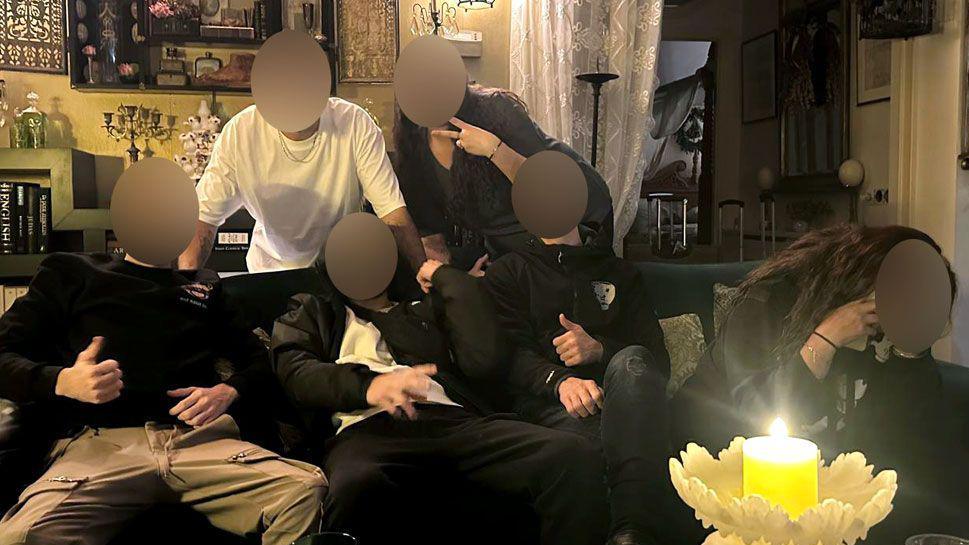
Esther Voet welcomed fans into her home to protect them from attack. Their faces are blurred to hide their identities
The Dutch government has responded by allocating €4.5m (£3.6m) to combat antisemitism and support victims.
Justice Minister David van Weel emphasised that Jewish people must feel safe in their own country and promised to deal severely with perpetrators.
However, the chairman of the Central Jewish Committee, Chanan Hertzberger, warned that these measures alone might not suffice.
He blamed in part an atmosphere where “antisemitic rhetoric has gone unchecked since 7 October", adding: "Our history teaches us that when people say they want to kill you, they mean it, and they will try."
The violence and its aftermath have also exposed political rifts, and some of the language from politicians has shocked the Netherlands’ Moroccan community.
Geert Wilders, whose far-right Freedom Party is the biggest of the four parties that make up the Dutch coalition government, has called for the deportation of dual nationals guilty of antisemitism.
Both he and coalition partner Caroline van der Plas, among others, have pointed the finger at young people of Moroccan or North African descent.
New arrests made in Amsterdam over violence after football match
- Published12 November 2024
One Dutch-Moroccan commentator, Hassnae Bouazza, complained that her community had for years been accused of not being integrated, and was now being threatened with having their Dutch nationality taken away.
Nadia Bouras, a Dutch historian of Moroccan descent, told Amsterdam’s Het Parool newspaper that using the term “integration” for people who had already lived in the Netherlands for four generations was like “holding them hostage”.
“You are holding them in a constant state of being foreign, even though they are not.”
The junior minister for benefits, Nora Achahbar, who was born in Morocco but grew up in the Netherlands, said on Friday she was standing down from the government because of racist language she had heard during a cabinet meeting on Monday, three days after the violence in Amsterdam.
She may not be the last.
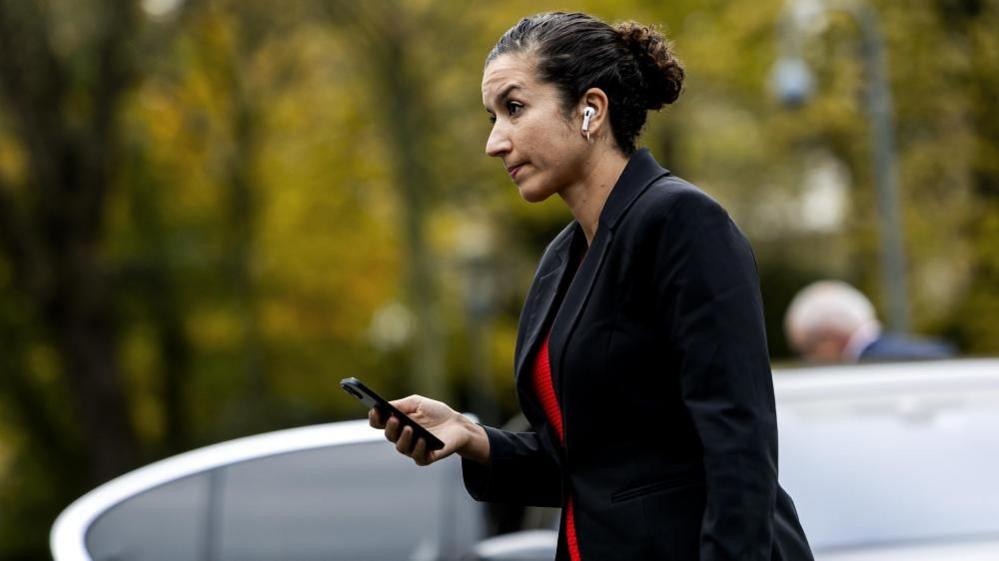
Junior minister Nora Achahbar decided to resign after she was alarmed by what she called racist language by coalition colleagues
Rabbi van de Kamp has told the BBC he is concerned that antisemitism is being politicised to further Islamophobic agendas.
He warns against repeating the exclusionary attitudes reminiscent of the 1930s, cautioning that such rhetoric not only endangers Jewish communities but deepens suspicions within society: "We must show that we cannot be made into enemies.”
The impact on Amsterdam's Muslim and Jewish residents is profound.
Many Jews have removed mezuzahs - the small Torah scrolls - from their doorposts, or they have covered them with duct tape out of fear of reprisal.
Esther Voet sees the emotional toll on her community: "It’s an exaggeration to say that the Netherlands now is like the 1930s, but we must pay attention and speak out when we see something that’s not right."
Muslims, meanwhile, argue they are being blamed for the actions of a small minority, before the perpetrators have even been identified.
Columnist Emine Uğur has herself faced increased threats as a vocal Muslim woman: "People feel emboldened."
She fears for her son's future in a polarised society where the lines of division seem to be hardening.
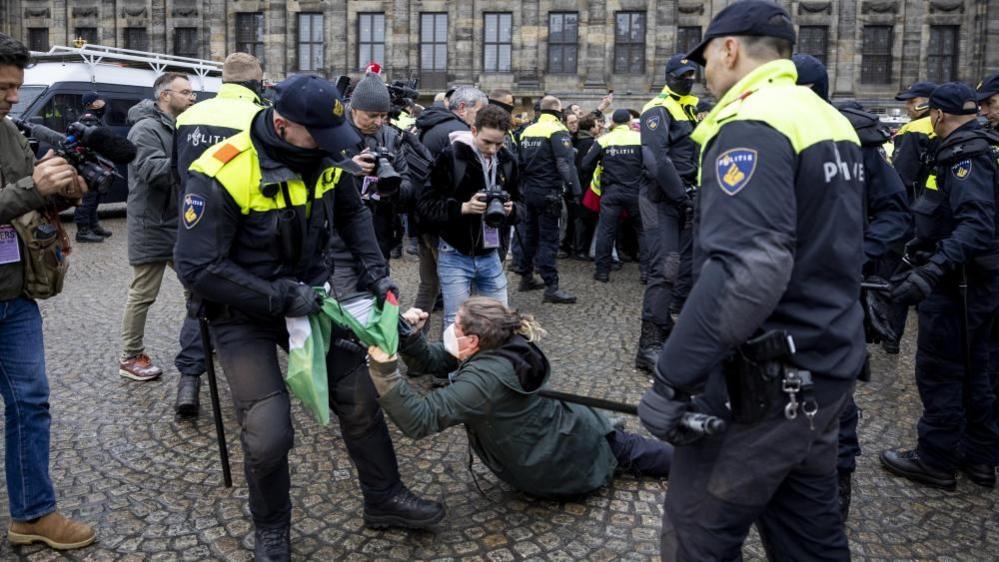
Pro-Palestinian demonstrators gathered in Amsterdam in the days after the violence, despite a ban on protests
Academics and community leaders have called for de-escalation and mutual understanding.
Bart Wallet, a professor of Jewish Studies at the University of Amsterdam, stresses the need for careful terminology, warning against equating the recent violence with pogroms of the past.
Like others, he hopes the violence was an isolated incident rather than a sign of worsening ethnic polarisation.
Mayor Femke Halsema is adamant that antisemitism should not be followed by other forms of racism, emphasising that the safety of one group must not come at the expense of another.
The violence has left Amsterdam questioning its identity as a diverse and tolerant city.
There is a collective recognition, in the Dutch capital and beyond, that as residents seek to rebuild trust, they must address the tensions that fuelled such unrest.
Rubbing his hands against the cold, as Amsterdam's cyclists stream by, Rabbi van de Kamp recalls his mother's words: "We are allowed to be very angry, but we must never hate."